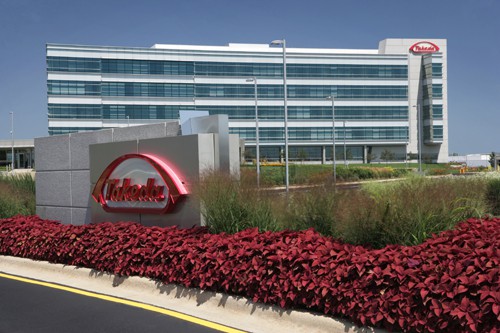
Takeda has reported updated results from a trial of its subcutaneous formulation of Entyvio in Crohn’s disease, showing activity over a year of treatment, as it tries to recover from the FDA’s rejection of the new drug in December.
New data from the VISIBLE 2 trial of maintenance therapy with the gut-selective formulation of Entyvio (vedolizumab) revealed that 48% of adult patients with moderately to severely active Crohn’s were in remission after 52 weeks, compared to 34% of a matched placebo group.
The subcutaneous formulation of the anti- alpha4beta7 integrin antibody was dosed every two weeks during follow-up, after an initial regimen of two doses of intravenous Entyvio to clear up symptoms.
The results were presented over the weekend at the Congress of the European Crohn’s and Colitis Organisation (ECCO) in Vienna, Austria. Secondary endpoint results were also reported at the show, but some didn’t help Takeda make its case for the drug.
An enhanced clinical response rate – defined as a 100 point or more improvement on the Crohn’s Disease Activity Index (CDAI) – was seen in 52% of the subcutaneous vedolizumab group versus 44.8% of those on placebo, which wasn’t a statistically significant difference.
Takeda’s drug did better on another outcome measure – the remission rate for patients on corticosteroid therapy at enrolment. At the end of the 52-week study 52% of patients on vedolizumab were in remission and off steroids, compared to just 18% of the control group.
Intravenous Entyvio – approved to treat Crohn’s and ulcerative colitis and on the US market since 2014 – is an increasingly important growth product for Takeda as the company tries to get growth back on track after losing patent protection for its big-selling multiple myeloma drug Velcade (bortezomib).
The drug – which is now available in more than 60 countries and is Takeda’s biggest-selling brand – has been emerging as the dominant antibody therapy for ulcerative colitis after outperforming AbbVie’s TNF blocker Humira (adalimumab) in a head-to-head trial.
Sales in the first nine months of Takeda’s current fiscal year were 264bn yen (around $2.4bn), up almost a third on the same period in the prior year.
Analysts at GlobalData have previously suggested that having two formulations of vedolizumab will allow Takeda to compete strongly against well-established ulcerative colitis drugs such as Humira and Johnson & Johnson’s Simponi (golimumab).
The Japanese drugmaker’s big setback a few weeks ago – when the FDA decided the data filed in support of the new formulation wasn’t sufficient to support its approval – knocked the programme back in the US, but it is still under review in other parts of the world including Europe.
Takeda said the regulator “posed questions unrelated to clinical data and conclusions from the pivotal trial supporting the biologics license application”.
Patent expiries and a weak near-term pipeline were the main drivers for Takeda’s $63bn takeover of Shire, which completed in January 2019.




